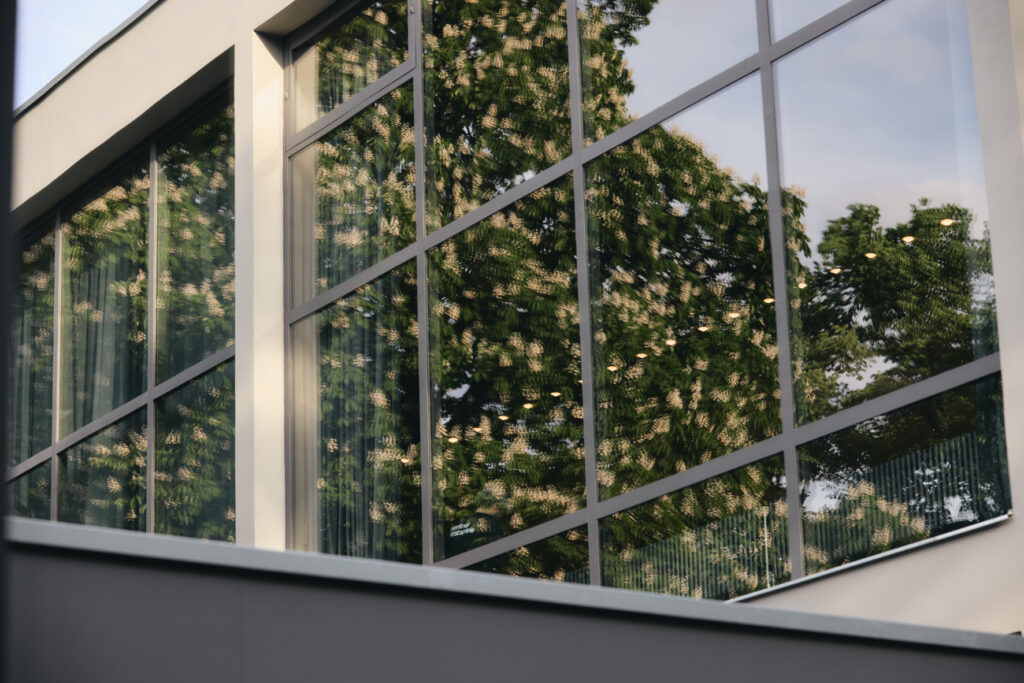–
The Haus der Berliner Festspiele – home to Germany’s most prestigious theatre festival, Theatertreffen – is a typical modernist building in one of Berlin’s most expensive districts, close to the Berlin University of the Arts, apartment lofts, expensive restaurants, and designer shops. It was originally intended to serve as the Free People’s Theatre [Theater der Freien Volksbühne]. Designed by Fritz Bornemann, the building was the realisation of a „democratic architecture“ – open to people, nature, and themes with a direct reference to society. The website of the theatre, which opened in 1963, states that its first artistic director was the socialist theatre director Erwin Piscator. He and his successors Kurt Hübner and Hans Neuenfels made the building in Schaperstraße an important venue for political theatre in Berlin.
Entering the Haus der Berliner Festspiele – which is only open to the public for a few weeks a year – is more like checking in at an airport than visiting a public cultural institution. No one crosses the threshold of the listed building without a ticket or a festival pass. The modernist architecture is not really accessible to the elderly, wheelchair users, and children. Access to the festival requires considerable financial resources – tickets for events are expensive, and prices can rise to five times the original price during Theatertreffen. In addition, there is a certain way of being, of being seen – a privileged social habitus that is assumed. Sometimes, the institution seems more like a fortress guarding a German-speaking, white, bourgeois identity than a place offering diverse possibilities for action and reflection, of which there is no shortage in multicultural Berlin.
For audiences who don’t speak German, Theatertreffen is a bad break. The ten remarkable productions selected by the seven-member jury have English subtitles, but they are placed in such a way that they are difficult to read. Things are a little better for the discussions – which are mostly in German, but with simultaneous English translation. None of the events in the main and accompanying programmes have yet been interpreted into sign language.
I write all this not without a reason, but to give an idea of the exclusions that the institution reproduces, and how it can be perceived through this lack of accessibility. Events that take place in an inaccessible institution inevitably become exclusive themselves.
The Theatertreffen itself takes place at the Haus der Festspiele Berlin in its 60th year. In 2023 – the anniversary year – Matthias Pees has taken over as Artistic Director, and appointed a new international management team for the renowned theatre festival: Olena Apchel, Carolin Hochleichter and Joanna Nuckowska. The directors, who come from three different cultural backgrounds, have set themselves the goal of opening up the institution and transforming the profile of Theatertreffen – which has hitherto been perceived as an insider event for theatre – into a place of encounter and exchange. The discussions and events developed by the directors not only refer to Western discourses, but also take into account the situation in Eastern Europe – especially in Belarus and Ukraine. The accompanying programme is divided into 10 Treffen, which refer to the second part of the festival title. Each session has a subtitle: Solidarity, Responsibility, Transfeminism, Herstory, etc. The question that runs through the whole festival is: Who has the privilege of not knowing? However, the various artistic interventions, discussions – even entire theatre productions planned for the accompanying programme – were seen from the outset by most of the country’s cultural critics as disruptive, or even threatening to the festival in its established form. For example, the performance „1 Minute Scream“ by artist Jana Shostak, which draws attention to the situation of political prisoners in Belarus, was criticised as an inappropriate intrusion into the relaxation of the audience, who, exhausted by the seven-hour opening marathon („The Inheritance„), wanted to sip a glass of champagne in peace.
The programme on Ukraine, which indeed has its highs („Line 8 und Pudding für alle!„) and lows („Putinprozess„), and to which cultural workers who have been largely deprived of their work opportunities by the war were invited, has been described by critics as political agitation and not, for example, a gesture of solidarity and responsibility for the consequences of a war that is only a few hours away from Berlin. One might argue that a theatre festival is not a place to discuss political and social issues, but a place to celebrate art. But what is art, and who can afford pure aesthetic contemplation these days? What is the role of culture in a society that does not want to be reduced to the aesthetic entertainment of the upper-middle class?
The first Artistic Director, Erwin Piscator – Bertold Brecht’s ally in the reform of German theatre – would hardly have left the festival in the form in which it was invented more than half a century ago. Epic and political theatre that opposes class exclusion and intervenes in world affairs also has a long tradition in Germany. Wouldn’t it make sense to build on this, instead of reproducing elitist exclusions?
I think that no Western European institution or festival can ignore a post-colonial, anti-capitalist, or feminist critique. The institution must abandon its role as guardian of culture, and begin to listen to the voices of the excluded, in order to become an ally or even an initiator of social change, instead of adopting the logic of a besieged fortress. If it does not, it will soon become a mausoleum.
